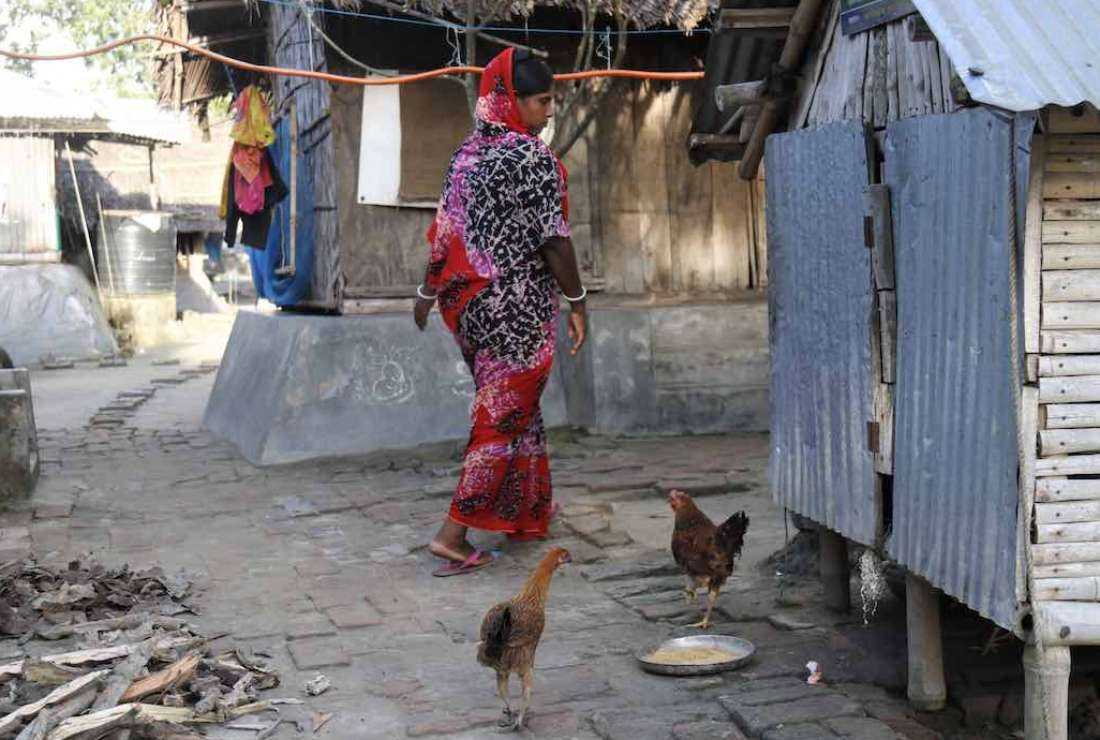
A Dalit woman from Bangladesh's Khulna area is seen on the premises of her home. Khulna diocesan officials estimate that Dalits form half of some 35,000 Catholics in its jurisdiction. (Photo: Stephan Uttam/ UCA News)
Two years ago, Kanika Das was in a relationship with a boy from a rich Catholic family and they planned to get married. However, their dreams were left in tatters when the boy’s family opposed the plan saying Kanika belonged to a Dalit Catholic family.
“When they [the boy's family] found out my father is a cobbler and we belonged to the Dalit caste, they called off the marriage. That is not my fault, I think this is my misfortune,” Kanika, 19, told UCA News.
Dalits are considered socially lower and economically weak in the Hindu caste system on the Indian subcontinent, which continues to be practiced within Catholic Churches in the region, including Bangladesh.
The two families, both living in Khulna district in southern Bangladesh, did not know each other earlier. Kanika and her boy met through a mutual friend and they maintained a close relationship for nearly two years.
The boy was ready to accept her Dalit background but “problems started when his family became aware of it," she said.
In the conservative village societies of Bangladesh, breaking off a publicly-known relationship is regarded as a disgrace for the girl. To ward off the shame, the family quickly arranged for her to marry a Hindu Dalit man, about a year ago.
Kanika’s experience is just one example of the social discrimination Dalit Catholics suffer within their own Catholic communities in various parts of Bangladesh.

Pope Francis (R) prays next to Rohingya refugees during an interreligious meeting in Dhaka on Dec 1, 2017. (Photo: AFP)
Discrimination turns full circle
For Kanika’s father, 52-year-old Monohor Das, it was a sad turn of events for the family. He converted to Catholicism at the age of 27 with several other Hindu Dalits, primarily to escape social discrimination.
Dalits, who were once considered untouchable on the Indian subcontinent, continue to suffer restrictions in entering public places like restaurants and temples. Their children are also denied education in schools where upper-caste Hindu students study.
“We thought once we became Christian we would be accepted like other Christians. But upper-caste Hindus, Christians, and even Muslims feel uncomfortable with a Dalit presence due to long-running social stigmas,” he told UCA News.
After conversion, Monohor managed to send his three daughters to a Church-run school. Kanika completed 10th grade before marriage while her two sisters are in grades 10 and 8.
A change of faith helped Dalits like him to educate their children in Christian schools, but society and the Church continue to discriminate against them, he said.
“Our children now get secondary level education. We are free to go to the market and barbershop. However, we are not equal to other Catholics. Even Church authorities do not consider us in decision-making bodies as they prefer only educated people,” he said.
Non-Dalit Catholics avoid the presence of Dalit Catholics. “So, we don’t mix with them. Change is possible only if they come forward,” Manohor said.
Kanika says her father hoped social discrimination would end when becoming a Catholic. “But in reality, there is still discrimination in our life,” she said referring to her marriage.
“It is true that I could complete secondary school only because my family was Christian. But if our Catholic community had taken better care of us, maybe I could get higher education and my life could be different,” she said.
Kanika now lives in a tin-roofed, bamboo-walled two-room house with her Hindu fisherman husband and father-in-law in the Dacop area of Khulna district. The house is built on government land close to the Pashur River where Kanika’s husband fishes for a living.
No data on Dalit Catholics
The Church in Bangladesh has no official data on Dalit Catholics.
Khulna diocesan officials estimate that Dalits form half of some 35,000 Catholics in its jurisdiction, where Jesuit missioners established the first church in the 17th century. The diocese is considered a Dalit Catholic stronghold.
The Sanskrit word "Dalit" literally means “trampled upon” and denotes those outside the four-tier Hindu caste system. Those outside the caste are considered “outcastes” and “untouchables’ by caste Hindus. India abolished untouchability in 1950, but discrimination continues in different forms in society.
Bangladeshi humanists introduced the term rishi (wise or sage) for Dalits, as an umbrella term for all outcastes to help avoid calling them derogatory names linked with their menial jobs.
They are most identified by the menial work they are engaged in such as methor (cleaner), dom (gravedigger), chamar (animal hide collector) muchi (cobbler), das (servant) and koiborto (fisherman).
Researchers say some 2 percent of Bangladesh’s 165 million people or 3.5 million belong to the Dalit community. Dalit leaders estimate their people are about ten million.
The number of Dalit Catholics, experts say, should be at least 10 percent of some 500,000 Catholics in the country.

Bangladeshi tribal women wearing traditional clothing dance at a rally held to mark International Indigenous Day in Dhaka on Aug 9, 2010. (Photo: AFP)
Masking Dalit identity
To mask their Dalit identity, some former Dalits, including Catholics, have changed their surnames and taken up better jobs.
Sudhir Sarkar, 45, was born as Sudhir Das. He changed his surname at the age of 16, before his secondary school examination.
“It is because Das is a Dalit title and I know even if I do well in life, I might not be treated well in society,” Sarkar, a Catholic and assistant director of an NGO, told UCA News.
He said the discriminatory attitude of non-Dalit Catholics is “understandable but what is surprising is the attitude of Catholic priests, who come to the Dalit community. They developed a sense of arrogance,” he said.
“They don't want to talk now freely when they see us. They think they belong to something higher. They don’t care about Dalits. But the reverse should have been the case. They should have shown more interest in the betterment of Dalit boys and girls,” Sarkar said.
Sarkar regretted that although the socio-economic condition of most Dalit Catholics is “miserable” the Church in Bangladesh has “no serious development plan” for those converted from Dalit groups.
“Foreign missionaries brought us to the Church. Still today local Christians continue to call us Dalit Christians, which is insulting,” he said.
Open forms of discrimination
“There are two kinds of Catholics in Bangladesh — Dalits and non-Dalits. Without any difficulty, publicly they call us Dalit Catholics,” Sarkar said.Sarkar pointed out that during parish programs, food is first served to higher caste Christians, the Dalit community will be served last.
“If someone from the Dalit community sits first, he will be pulled out and moved,” he said.
The cases of the uneducated, shabbily dressed and those engaged in menial work are even more miserable.
“Most Catholics think they can’t do anything worthwhile. So, they continue to lag behind.”Swapan Das, a 34-year Dalit Catholic and rickshaw puller in Khulna city, explained how Dalit Catholics are excluded during Church programs.
“Three years ago, my five-year-old son went to the church. I wanted him to sit with other boys, but one Sunday a 12-year-old forcibly pushed him away calling him a rickshaw puller’s son. Now, my son sits with me when we go to church,” he said.
Sarkar said education could make a difference because educated Dalit people seem to be getting some acceptance in the Catholic community.

A Catholic priest (C) along with the faithful offer prayers at a cemetery during ‘All Souls Day’ in Dhaka on Nov 2, 2022. (Photo: AFP)
Social change comes slower
Italian Xaverian priest, Germano Antonio, who has worked among Dalits for over two decades noted that despite efforts, Dalits have made little progress in socio-economic development.
“Among the Dalits, the people of one or two villages have made some progress in terms of education, and jobs but still lag in terms of social status. Sometimes they are discriminated against among us Christians,” Father Antonio, 83, told UCA News.
Members of St. Francis Xavier for Foreign Missions, popularly known as Xaverian missionaries, have served in southern Bangladesh since 1895 and contributed to the development of Khulna diocese, working particularly with Dalits
Father Antonio said non-Dalit students are preferred over Dalit students in Catholic colleges in the city.
“It is often assumed that they have no money,” he said.
The priest noted any social change takes a long time, so a change of fortune for Dalits will take more time.
“But the Church needs to make a long-term plan to educate Dalits. Only then it is possible to prevent discrimination against them,” he said.
Rickshaw puller Swapan says a Catholic priest rebuked him for continuing the education of his daughters when he asked for some monetary help for their schooling.
“Instead of helping me, the priest asked me what’s the use of educating girls. Give your daughters in marriage,” he recalled.
Education and wealth valued
“If you want to have social respect you must have money and education. Even Church authorities prioritize those who are rich and educated and do not value those who are poor, especially Dalit people, Swapan told UCA News.
Catholic officials and leaders say the Church has been working for the development of the Dalit community for years. Catholic charity Caritas has a special project for the education and social development of Dalit people.
Caritas Khulna regional director Daud Jibon Das, who also hails from the Dalit community, said Dalit Catholics in higher education is about 10 percent whereas it is about 70 percent among other Catholics.
“The Church is working on it, but the Church has financial limitations, it cannot do many things even if it wants to,” Das told UCA News.
“If there is no support from the government, then these Dalit people will not be able to develop through their own efforts alone,” he added.

Catholics attend a prayer service on Christmas Day at the Holy Rosary Church in Dhaka on Dec 25, 2020. (Photo: AFP)
Progress is impossible without state help
Father Jacob S. Biswas, Vicar-General of Khulna diocese, said that the Church has spent “a considerable amount of money” and energy over the years on the socio-economic development of Dalit people.
“But they could not develop compared to what has been spent. It is because of the lack of education. The Church is also working for their education,” Father Biswas said.
The priest said the diocese has started a special fundraising program for poor, talented students which will be spent only on the education of backward communities like Dalit people.
Parittran, a Khulna-based development organization working for the development of the Dalits community, is directed by Milan Das, a Dalit Hindu.
He says foreign missionaries played a vital role in awakening Dalit people to their rights.
“Dalit people now speak against discrimination. But no matter how much we talk, discrimination cannot be removed from people's minds,” he told UCA News.
Milan Das said the Church’s work among Dalits should be strengthened, especially in the education sector.
“More seminars or various educational training should be held together to close the gulf between Dalits and other Catholics,” he added.
A government official said the state has been taking all measures to assist and prioritize Dalit people in social security schemes.
"We are now moving towards development in a coordinated way with everyone. We are working to ensure that no one is left behind,” Ainul Haque, assistant director of the Social Services Department in Khulna told UCA News.
Kanika still laments her misfortunes because of her Dalit background.
“Being born in a Dalit family was a curse for me. I could have studied further and taken up a job with a good salary. All I want now is for inequality to be removed from our society.” she said.
(* Names of Dalit Catholics quoted are changed to protect their identity)




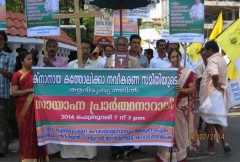
A ‘pure blood’ claim that discriminates among Indian Catholics
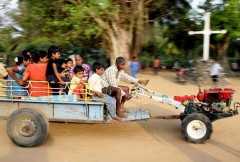
Minority Tamil Catholics feel shortchanged by Sri Lankan Church
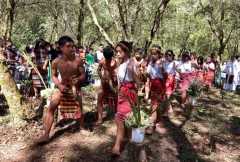
Indigenous people feel abandoned by Philippine Church
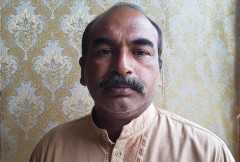
Cast out for doing the dirty work in Pakistan
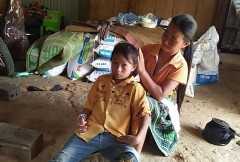
Ethnic Catholics suffer social inequity in Vietnam
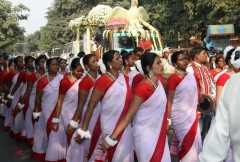
Indian tribal Christians are a forlorn minority in Delhi